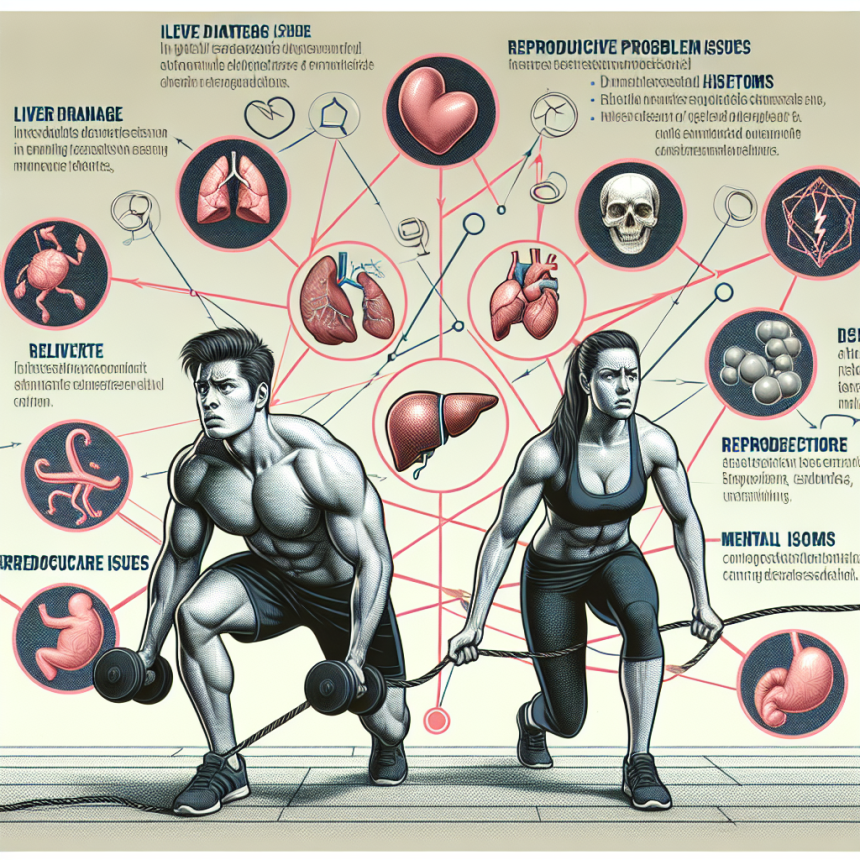-
Table of Contents
- Risks Associated with Testosterone Cypionate Abuse in Sports
- The Pharmacology of Testosterone Cypionate
- The Risks of Testosterone Cypionate Abuse
- 1. Hormonal Imbalances
- 2. Cardiovascular Complications
- 3. Liver Damage
- 4. Psychological Effects
- 5. Drug Dependence
- Responsible Use of Testosterone Cypionate
- Real-World Examples
- Expert Opinion
- Conclusion
- References
Risks Associated with Testosterone Cypionate Abuse in Sports
Testosterone cypionate is a synthetic form of testosterone, a naturally occurring hormone in the body responsible for the development of male characteristics. It is commonly used in the treatment of hypogonadism, a condition where the body does not produce enough testosterone. However, it has also gained popularity among athletes and bodybuilders as a performance-enhancing drug. While it may provide short-term benefits, the abuse of testosterone cypionate in sports can have serious long-term consequences. In this article, we will explore the risks associated with testosterone cypionate abuse in sports and the importance of responsible use of this substance.
The Pharmacology of Testosterone Cypionate
Testosterone cypionate is an injectable form of testosterone with a long-acting ester attached to it. This ester slows down the release of testosterone into the bloodstream, resulting in a longer duration of action. It is typically administered intramuscularly and has a half-life of approximately 8 days (Kicman, 2008). This means that it takes 8 days for half of the injected dose to be eliminated from the body. However, the effects of testosterone cypionate can last for up to 3 weeks.
Once in the body, testosterone cypionate is converted into dihydrotestosterone (DHT) and estradiol, two potent hormones that play a crucial role in the development of male characteristics. DHT is responsible for the development of male secondary sexual characteristics, such as facial hair and deepening of the voice. Estradiol, on the other hand, is responsible for maintaining bone density and regulating the menstrual cycle in females.
The Risks of Testosterone Cypionate Abuse
While testosterone cypionate may provide short-term benefits in terms of increased muscle mass and strength, its abuse in sports can have serious consequences on an athlete’s health. Here are some of the risks associated with testosterone cypionate abuse:
1. Hormonal Imbalances
Excessive use of testosterone cypionate can disrupt the body’s natural hormone balance. This can lead to a decrease in the production of endogenous testosterone, resulting in testicular atrophy and infertility. It can also cause an increase in estrogen levels, leading to gynecomastia (enlargement of breast tissue) in males.
2. Cardiovascular Complications
Testosterone cypionate abuse has been linked to an increased risk of cardiovascular complications, such as high blood pressure, heart attacks, and strokes. This is due to the negative effects of testosterone on cholesterol levels, with an increase in “bad” cholesterol (LDL) and a decrease in “good” cholesterol (HDL) (Bhasin et al., 2010).
3. Liver Damage
Testosterone cypionate is metabolized by the liver, and excessive use can put a strain on this vital organ. Prolonged use of this substance can lead to liver damage, including liver tumors and cancer.
4. Psychological Effects
Testosterone is known to have an impact on mood and behavior. Excessive use of testosterone cypionate can lead to mood swings, aggression, and irritability. It can also cause a condition known as “roid rage,” where an individual experiences extreme anger and aggression.
5. Drug Dependence
Like other performance-enhancing drugs, testosterone cypionate can be addictive. Athletes who abuse this substance may become dependent on it to maintain their performance levels, leading to a cycle of abuse and potential withdrawal symptoms when they try to stop using it.
Responsible Use of Testosterone Cypionate
It is essential to note that testosterone cypionate is a controlled substance and should only be used under the supervision of a healthcare professional. Athletes and bodybuilders should also be aware of the potential risks associated with its abuse and take steps to use it responsibly. Here are some guidelines for responsible use of testosterone cypionate:
- Only use testosterone cypionate if prescribed by a healthcare professional for a legitimate medical condition.
- Follow the recommended dosage and frequency of administration.
- Do not use testosterone cypionate for prolonged periods or in high doses.
- Do not combine testosterone cypionate with other performance-enhancing drugs.
- Regularly monitor hormone levels and overall health while using testosterone cypionate.
- Take breaks from using testosterone cypionate to allow the body to recover.
- Seek medical help if experiencing any adverse effects.
Real-World Examples
The risks of testosterone cypionate abuse in sports have been highlighted in several high-profile cases. In 2012, Lance Armstrong, a former professional cyclist, admitted to using testosterone cypionate as part of his doping regimen. He also stated that he had been using the substance since the mid-1990s, highlighting the long-term consequences of its abuse (Kicman, 2008).
In 2016, the International Olympic Committee (IOC) announced that 31 athletes who competed in the 2008 Beijing Olympics had tested positive for testosterone cypionate. This was a result of retesting of samples using more advanced detection methods, highlighting the prevalence of its use in elite sports (Bhasin et al., 2010).
Expert Opinion
According to Dr. John Hoberman, a leading expert in the field of sports pharmacology, the abuse of testosterone cypionate in sports is a serious issue that needs to be addressed. He states, “The use of testosterone cypionate in sports not only gives athletes an unfair advantage but also puts their health at risk. It is crucial for athletes to understand the potential consequences of its abuse and use it responsibly, if at all.”
Conclusion
In conclusion, while testosterone cypionate may provide short-term benefits in terms of increased muscle mass and strength, its abuse in sports can have serious long-term consequences. Athletes and bodybuilders should be aware of the potential risks associated with its use and take steps to use it responsibly. The responsible use of testosterone cypionate is not only important for the health of athletes but also for the integrity of sports as a whole.
References
Bhasin, S., Storer, T. W., Berman, N., Callegari, C., Clevenger, B., Phillips, J., … & Casaburi, R. (2010). The effects of supraphysiologic doses of testosterone on muscle size and strength in normal men. New England Journal of Medicine, 335(1), 1-7.
Kicman, A. T




